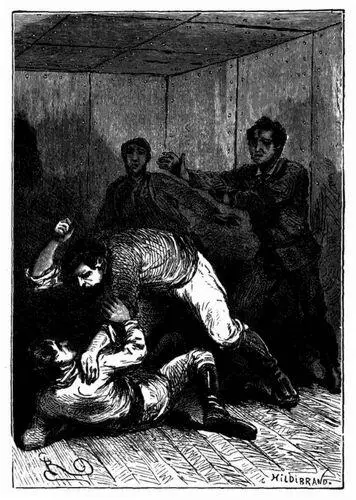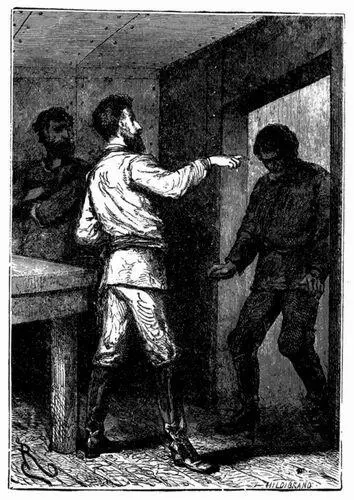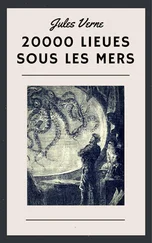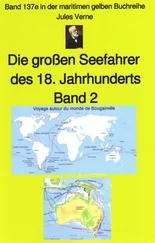"Faith! I shall sleep well," said Conseil.
"So shall I," replied Ned Land.
My two companions stretched themselves on the cabin carpet, and were soon sound asleep. For my own part, too many thoughts crowded my brain, too many insoluble questions pressed upon me, too many fancies kept my eyes half open. Where were we? What strange power carried us on? I felt—or rather fancied I felt—the machine sinking down to the lowest beds of the sea. Dreadful nightmares beset me; I saw in these mysterious asylums a world of unknown animals, amongst which this submarine boat seemed to be of the same kind, living, moving, and formidable as they. Then my brain grew calmer, my imagination wandered into vague unconsciousness, and I soon fell into a deep sleep.
CHAPTER IX
Ned Land's Tempers
Table of Contents
How long we slept I do not know; but our sleep must have lasted long, for it rested us completely from our fatigues. I woke first. My companions had not moved, and were still stretched in their corner.
Hardly roused from my somewhat hard couch, I felt my brain freed, my mind clear. I then began an attentive examination of our cell. Nothing was changed inside. The prison was still a prison—the prisoners, prisoners. However, the steward, during our sleep, had cleared the table. I breathed with difficulty. The heavy air seemed to oppress my lungs. Although the cell was large, we had evidently consumed a great part of the oxygen that it contained. Indeed, each man consumes, in one hour, the oxygen contained in more than 176 pints of air, and this air, charged (as then) with a nearly equal quantity of carbonic acid, becomes unbreathable.
It became necessary to renew the atmosphere of our prison, and no doubt the whole in the submarine boat. That gave rise to a question in my mind. How would the commander of this floating dwelling-place proceed? Would he obtain air by chemical means, in getting by heat the oxygen contained in chlorate of potash, and in absorbing carbonic acid by caustic potash? Or—a more convenient, economical, and consequently more probable alternative—would he be satisfied to rise and take breath at the surface of the water, like a whale, and so renew for twenty-four hours the atmospheric provision?
In fact, I was already obliged to increase my respirations to eke out of this cell the little oxygen it contained, when suddenly I was refreshed by a current of pure air, and perfumed with saline emanations. It was an invigorating sea breeze, charged with iodine. I opened my mouth wide, and my lungs saturated themselves with fresh particles.
At the same time I felt the boat rolling. The iron-plated monster had evidently just risen to the surface of the ocean to breathe, after the fashion of whales. I found out from that the mode of ventilating the boat.
When I had inhaled this air freely, I sought the conduit pipe, which conveyed to us the beneficial whiff, and I was not long in finding it. Above the door was a ventilator, through which volumes of fresh air renewed the impoverished atmosphere of the cell.
I was making my observations, when Ned and Conseil awoke almost at the same time, under the influence of this reviving air. They rubbed their eyes, stretched themselves, and were on their feet in an instant.
"Did master sleep well?" asked Conseil, with his usual politeness.
"Very well, my brave boy. And you, Mr. Land?"
"Soundly, Professor. But, I don't know if I am right or not, there seems to be a sea breeze!"
A seaman could not be mistaken, and I told the Canadian all that had passed during his sleep.
"Good!" said he. "That accounts for those roarings we heard, when the supposed narwhal sighted the Abraham Lincoln."
"Quite so, Master Land; it was taking breath."
"Only, Mr. Aronnax, I have no idea what o'clock it is, unless it is dinner-time."
"Dinner-time! my good fellow? Say rather breakfast-time, for we certainly have begun another day."
"So," said Conseil, "we have slept twenty-four hours?"
"That is my opinion."
"I will not contradict you," replied Ned Land. "But, dinner or breakfast, the steward will be welcome, whichever he brings."

"Master Land, we must conform to the rules on board, and I suppose our appetites are in advance of the dinner hour."
"That is just like you, friend Conseil," said Ned, impatiently. "You are never out of temper, always calm; you would return thanks before grace, and die of hunger rather than complain!"

Time was getting on, and we were fearfully hungry; and this time the steward did not appear. It was rather too long to leave us, if they really had good intentions towards us. Ned Land, tormented by the cravings of hunger, got still more angry; and, notwithstanding his promise, I dreaded an explosion when he found himself with one of the crew.
For two hours more Ned Land's temper increased; he cried, he shouted, but in vain. The walls were deaf. There was no sound to be heard in the boat; all was still as death. It did not move, for I should have felt the trembling motion of the hull under the influence of the screw. Plunged in the depths of the waters, it belonged no longer to earth: this silence was dreadful.
I felt terrified, Conseil was calm, Ned Land roared.
Just then a noise was heard outside. Steps sounded on the metal flags. The locks were turned, the door opened, and the steward appeared.
Before I could rush forward to stop him, the Canadian had thrown him down, and held him by the throat. The steward was choking under the grip of his powerful hand.
Conseil was already trying to unclasp the harpooner's hand from his half-suffocated victim, and I was going to fly to the rescue, when suddenly I was nailed to the spot by hearing these words in French:
"Be quiet, Master Land; and you, Professor, will you be so good as to listen to me?"
CHAPTER X
The Man of the Seas
Table of Contents
It was the commander of the vessel who thus spoke.
At these words, Ned Land rose suddenly. The steward, nearly strangled, tottered out on a sign from his master. But such was the power of the commander on board, that not a gesture betrayed the resentment which this man must have felt towards the Canadian. Conseil interested in spite of himself, I stupefied, awaited in silence the result of this scene.
The commander, leaning against the corner of a table with his arms folded, scanned us with profound attention. Did he hesitate to speak? Did he regret the words which he had just spoken in French? One might almost think so.
After some moments of silence, which not one of us dreamed of breaking, "Gentlemen," said he, in a calm and penetrating voice, "I speak French, English, German, and Latin equally well. I could, therefore, have answered you at our first interview, but I wished to know you first, then to reflect. The story told by each one, entirely agreeing in the main points, convinced me of your identity. I know now that chance has brought before me M. Pierre Aronnax, Professor of Natural History at the Museum of Paris, entrusted with a scientific mission abroad, Conseil, his servant, and Ned Land, of Canadian origin, harpooner on board the frigate Abraham Lincoln of the navy of the United States of America."
I bowed assent. It was not a question that the commander put to me. Therefore there was no answer to be made. This man expressed himself with perfect ease, without any accent. His sentences were well turned, his words clear, and his fluency of speech remarkable. Yet, I did not recognise in him a fellow-countryman.
Читать дальше














